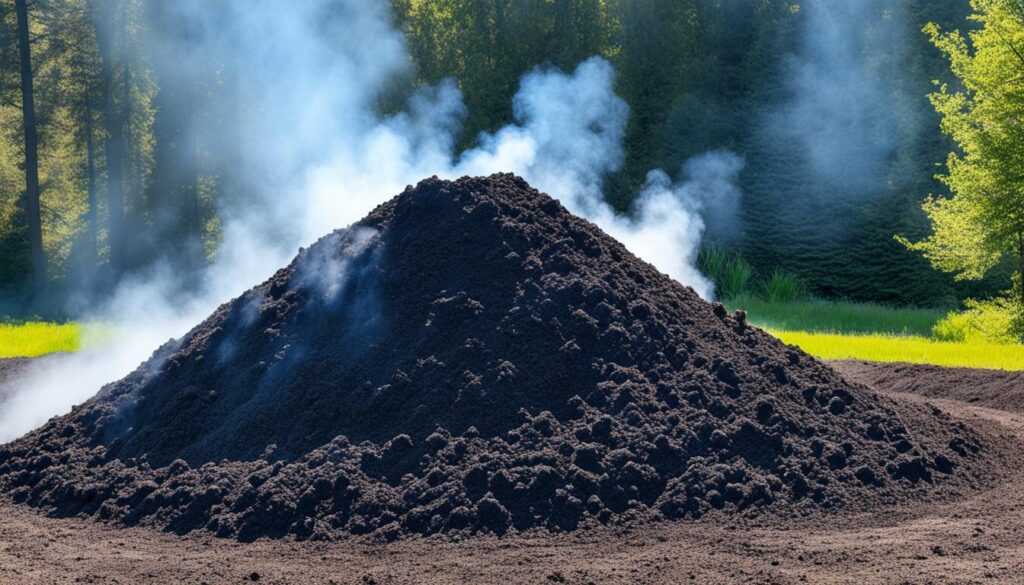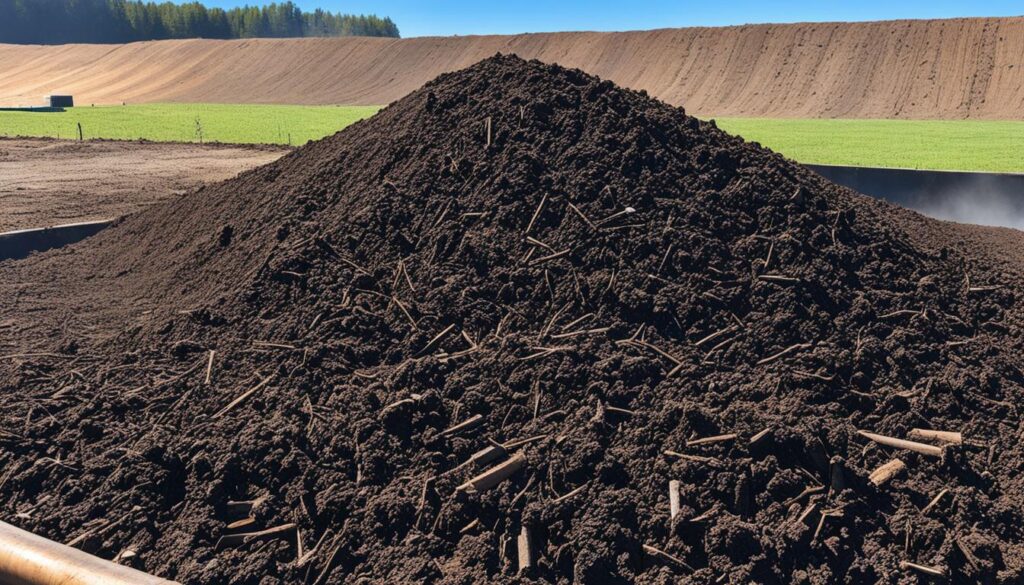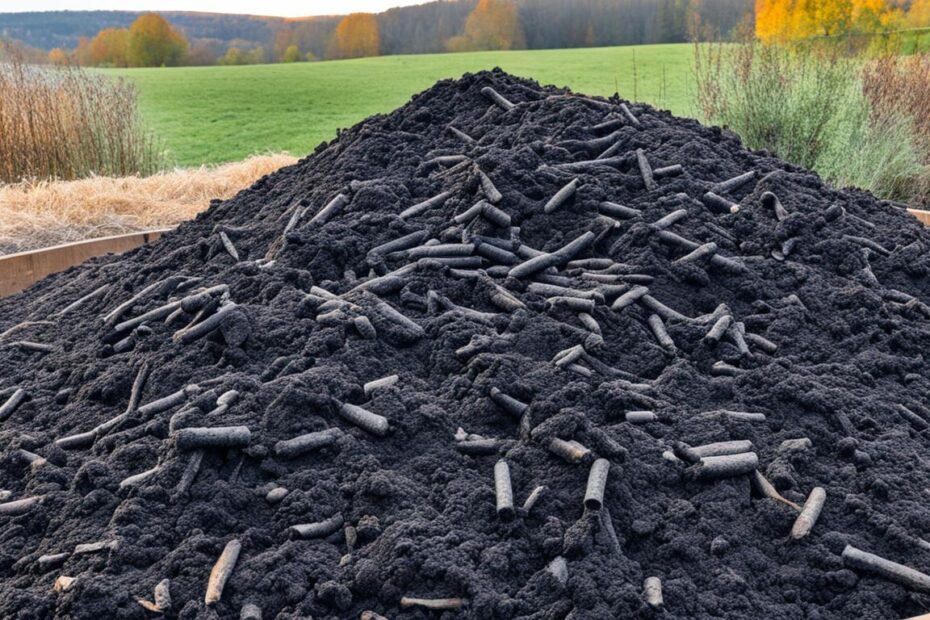As the demand for sustainable agricultural practices grows, the exploration of renewable resources has become increasingly important. One such innovative solution is the use of horse manure as a feedstock for producing biochar, a highly valuable soil amendment with a wide range of benefits.
This article delves into the advantages of using equine manure biochar in agriculture, the process of sustainable biochar production, and the environmental and economic opportunities it presents.
Key Takeaways
- Biochar produced from horse manure is a carbon-rich soil amendment that can enhance agricultural productivity and sustainability.
- Equine manure is an abundant and nutrient-rich feedstock for biochar production, offering a sustainable solution for agricultural waste management.
- Biochar production from animal manure can contribute to carbon sequestration and reduce greenhouse gas emissions.
- Incorporating horse manure biochar into soil can improve its structure, water retention, and nutrient levels, leading to enhanced plant growth and yields.
- The production and use of biochar from agricultural waste present economic opportunities in the renewable energy and sustainable agriculture sectors.
Intro to Biochar and its Benefits
Biochar is a remarkable carbon-rich substance that has gained significant attention in the agricultural and environmental spheres.
Produced through the process of pyrolysis, where organic biomass is heated in the absence of oxygen, biochar offers a host of benefits that make it a valuable asset for sustainable farming practices.
What is Biochar?
At its core, biochar is a porous, charcoal-like material that is created by heating biomass, such as agricultural waste or wood, in a low-oxygen environment.
This unique process results in a highly stable form of carbon that can be effectively incorporated into soil, providing a range of advantages for both plants and the environment.
Advantages of Using Biochar in Agriculture
The benefits of using biochar in agriculture are numerous and far-reaching. Some of the key advantages include:
- Improved soil structure and water retention: Biochar’s porous nature helps to improve soil texture, increase water-holding capacity, and enhance overall soil health.
- Enhanced nutrient retention and availability: Biochar can adsorb and hold onto essential nutrients, making them more readily available for plant uptake.
- Increased crop yields: Studies have shown that the application of biochar can lead to significant increases in crop productivity and yields.
- Reduced greenhouse gas emissions: Biochar can help sequester carbon, effectively removing it from the atmosphere and reducing the overall carbon footprint of agricultural practices.
By harnessing the power of biochar, farmers and agricultural professionals can work towards more sustainable and environmentally-friendly farming methods, while reaping the rewards of improved soil health and increased crop yields.
Using Horse Manure in Biochar Production
When it comes to producing high-quality biochar, the abundance of horse manure as a feedstock presents a unique opportunity.
Horse manure is a readily available agricultural waste product that can be transformed into a valuable soil amendment through the process of pyrolysis.
Abundance of Horse Manure as a Feedstock
Horse owners and farms generate a significant amount of horse manure, which is often seen as a waste product that requires disposal.
However, this abundant resource can be leveraged for the production of nutrient-rich biochar. By utilizing horse manure in the biochar production process, the environmental impact of this waste stream can be reduced while creating a valuable soil additive.
Nutrient Profile of Horse Manure Biochar
The nutrient profile of horse manure biochar is particularly noteworthy. Horse manure is rich in essential nutrients such as nitrogen, phosphorus, and potassium, which are essential for plant growth and soil health.
When converted into biochar through pyrolysis, these nutrients become concentrated and locked into a stable carbon structure, creating a highly effective soil amendment for agriculture.
| Nutrient | Concentration in Horse Manure Biochar |
|---|---|
| Nitrogen (N) | 2.5-4.0% |
| Phosphorus (P) | 1.0-2.5% |
| Potassium (K) | 1.5-3.0% |

The abundance of horse manure as a feedstock, combined with its nutrient-rich profile, makes it an excellent choice for the production of biochar.
By incorporating horse manure biochar into agricultural soils, farmers and gardeners can improve soil structure, water retention, and nutrient availability, ultimately enhancing the productivity and sustainability of their land.
The Biochar Production Process
The biochar production process is a complex yet fascinating journey that transforms organic biomass into a highly valuable soil amendment. At the heart of this process lies the process of pyrolysis – the thermal decomposition of biomass in the absence of oxygen.
This controlled burning creates a carbon-rich, porous material known as biochar, which can then be optimized and refined to enhance its benefits for agricultural applications.
The key steps involved in the biochar production process include:
- Feedstock Preparation: The organic material, such as horse manure, is carefully selected, dried, and processed to ensure consistent quality and size.
- Pyrolysis: The feedstock is heated to high temperatures, typically between 350-900°C, in a low-oxygen environment. This process drives off volatile compounds, leaving behind the carbon-rich biochar.
- Temperature and Oxygen Control: Maintaining precise control over the temperature and oxygen levels is crucial to optimize the biochar’s properties, such as its surface area, pore structure, and nutrient content.
- Post-Processing: Once the biochar is produced, it may undergo additional processing, such as grinding, sieving, or the addition of specific amendments, to further enhance its performance as a soil amendment.
| Key Steps in Biochar Production | Description |
|---|---|
| Feedstock Preparation | Drying, sizing, and processing the organic material to ensure consistent quality |
| Pyrolysis | Heating the feedstock in a low-oxygen environment to drive off volatile compounds and create carbon-rich biochar |
| Temperature and Oxygen Control | Precisely managing the temperature and oxygen levels to optimize the biochar’s properties |
| Post-Processing | Additional processing, such as grinding, sieving, or adding amendments, to further enhance the biochar’s performance |
By understanding and carefully controlling each step of the biochar production process, researchers and practitioners can unlock the full potential of this remarkable soil amendment, paving the way for a more sustainable and productive agricultural future.
Environmental Benefits of Using Horse Manure Biochar
The use of horse manure biochar offers a wealth of environmental benefits that contribute to more sustainable agricultural practices. Two key advantages of this carbon-rich soil amendment are its remarkable potential for long-term carbon sequestration and its ability to significantly reduce greenhouse gas emissions.
Carbon Sequestration Potential
Biochar, a product of the pyrolysis process, is highly resistant to decomposition, making it an excellent tool for sequestering atmospheric carbon dioxide.
When incorporated into the soil, the carbon sequestration potential of biochar can help mitigate the effects of climate change by locking away carbon for centuries, if not millennia.
Reducing Greenhouse Gas Emissions
In addition to its carbon-capturing abilities, the use of horse manure biochar can also help reduce greenhouse gas emissions associated with traditional agricultural practices. By improving soil fertility and water-holding capacity, biochar can reduce the need for synthetic fertilizers and excessive irrigation, thereby minimizing the release of methane and nitrous oxide into the atmosphere.
Furthermore, the environmental benefits of using horse manure biochar extend beyond the farm, as it provides a sustainable solution for managing agricultural waste.
By converting horse manure into a valuable soil amendment, the burden on landfills and the associated greenhouse gas emissions are significantly reduced.
The implementation of horse manure biochar in agricultural systems is a strategic move towards a more sustainable future, offering tangible solutions to pressing environmental challenges. As the demand for eco-friendly practices continues to grow, the adoption of this innovative technology can play a crucial role in mitigating climate change and promoting long-term soil health.
Biochar as a Soil Amendment
Biochar, a unique product created by the pyrolysis of organic matter, has emerged as a game-changing soil amendment with remarkable capabilities.
Its incorporation into agricultural soils can significantly improve soil structure and enhance water retention, ultimately boosting the overall health and productivity of the land.
Improving Soil Structure and Water Retention
The porous and highly absorbent nature of biochar allows it to act as a soil conditioner, improving the physical properties of the soil. When added to the soil, biochar helps to increase aeration, reduce compaction, and enhance the soil’s ability to retain moisture.
This improved soil structure not only benefits plant growth but also contributes to the efficient use of water resources, reducing the need for frequent irrigation.
- Increased water-holding capacity: Biochar’s intricate network of pores and channels helps to capture and store water, making it available for plants when they need it most.
- Improved soil aggregation: The addition of biochar to the soil encourages the formation of stable soil aggregates, enhancing the overall soil structure and preventing erosion.
- Enhanced nutrient retention: Biochar’s large surface area and negative charge allow it to adsorb and retain essential nutrients, preventing them from being leached or washed away, and making them readily available to plants.
| Soil Property | Improvement with Biochar |
|---|---|
| Water-holding capacity | Up to 30% increase |
| Nutrient retention | Increased cation exchange capacity |
| Soil aggregation | Enhanced soil structure |
By leveraging the unique properties of biochar, farmers and gardeners can unlock the full potential of their soils, leading to more sustainable and productive agricultural practices.
Sustainable Waste Management with Biochar
The production and application of biochar from horse manure offer a promising solution for sustainable waste management. By diverting this agricultural waste from landfills or traditional disposal methods, the process of transforming horse manure into biochar creates a valuable, carbon-sequestering soil amendment.
Biochar is a highly porous, charcoal-like material produced through the process of pyrolysis – the thermochemical decomposition of organic matter in the absence of oxygen.
When applied to soil, biochar can improve soil structure, enhance water retention, and increase nutrient availability, ultimately leading to improved crop yields and healthier ecosystems.
The use of horse manure as a feedstock for biochar production offers several advantages. Horse manure is readily available in many agricultural settings, making it a abundant and accessible resource.
Furthermore, the nutrient-rich composition of horse manure, including high levels of nitrogen, phosphorus, and potassium, can translate into a biochar product that is highly beneficial for soil amendment and plant growth.
The Environmental Benefits of Biochar
Beyond its utility as a soil conditioner, the production and application of horse manure biochar can also contribute to broader environmental sustainability.
Biochar has the potential to sequester carbon, effectively removing it from the atmosphere and storing it in the soil for extended periods. This process can help mitigate the effects of climate change by reducing greenhouse gas emissions.
Additionally, the diversion of horse manure from traditional disposal methods, such as landfills, can help reduce the environmental impact of waste management.
By converting this agricultural waste into a valuable soil amendment, the sustainable waste management with biochar approach helps to close the loop on resource utilization and minimize the amount of waste sent to landfills or other disposal sites.
| Biochar Benefits | Environmental Impact |
|---|---|
| Improved soil structure and water retention | Carbon sequestration and reduced greenhouse gas emissions |
| Enhanced nutrient availability for plants | Diversion of agricultural waste from landfills |
| Increased crop yields and healthier ecosystems | Closing the loop on resource utilization |
By embracing the sustainable waste management opportunities presented by biochar production from horse manure, farmers, land managers, and communities can contribute to a more circular and environmentally conscious approach to agricultural waste management.

Economic Opportunities in Biochar Production
The production of biochar from horse manure presents a range of compelling economic opportunities. By creating value from agricultural waste, biochar production can generate revenue, reduce waste management costs, and even spur the development of new business models centered around the sustainable utilization of waste streams.
Creating Value from Agricultural Waste
One of the key economic benefits of biochar production is the ability to transform waste materials, such as horse manure, into a valuable product.
Biochar can be sold as a soil amendment, providing a revenue stream for producers and reducing the burden on traditional waste disposal methods. This not only creates a new income source but also contributes to a more circular economy, where waste is repurposed rather than simply discarded.
Furthermore, the production of biochar can help offset the costs associated with the management and disposal of agricultural waste.
By converting horse manure into a usable and marketable product, producers can reduce their expenditures on waste management, potentially leading to significant cost savings.
| Metric | Value |
|---|---|
| Potential Revenue from Biochar Sales | $50 – $200 per ton |
| Estimated Waste Management Cost Savings | $20 – $50 per ton of horse manure |
These economic opportunities can encourage the development of new business models and entrepreneurial ventures focused on the economic opportunities in biochar production and the creating value from agricultural waste.
Challenges and Considerations
While the use of horse manure biochar offers significant benefits, there are also important challenges and considerations to address.
One of the key factors is ensuring compliance with relevant regulations and maintaining high-quality standards for the biochar product.
Regulations and Quality Control
The biochar industry is subject to various regulations and guidelines, which can vary depending on the region and application. Producers of horse manure biochar must be aware of these rules and ensure that their products meet the necessary criteria for safety, environmental impact, and agricultural use.
Consistent quality control measures, such as thorough testing and certification, are crucial to maintaining the integrity and efficacy of the biochar.
Additionally, ongoing research and collaboration with regulatory bodies can help shape the development of more comprehensive guidelines for the biochar industry.
By proactively addressing these regulatory and quality control challenges, producers can instill confidence in the market and promote the widespread adoption of horse manure biochar as a sustainable soil amendment.
FAQ
What is biochar and how can it benefit agriculture?
Biochar is a carbon-rich, porous material produced through the pyrolysis (heating in the absence of oxygen) of organic biomass. It has gained significant attention in the agricultural and environmental sectors due to its ability to improve soil health, enhance plant growth, and sequester carbon.
Why is horse manure a good feedstock for biochar production?
Horse manure is an abundant and readily available agricultural waste product that can be transformed into high-quality biochar. It has a nutrient-rich composition, making it an ideal feedstock for the production of a valuable soil amendment.
How is biochar produced from horse manure?
The biochar production process from horse manure involves the pyrolysis (heating in the absence of oxygen) of the organic material. This process controls the temperature and oxygen levels to ensure the production of high-quality biochar with optimal properties for use as a soil amendment.
What are the environmental benefits of using horse manure biochar?
The use of horse manure biochar offers significant environmental benefits, including its potential for long-term carbon sequestration and its ability to reduce greenhouse gas emissions. Biochar also helps improve soil structure and water retention, contributing to more sustainable agricultural practices.
How can biochar be used as a soil amendment?
Biochar’s unique properties make it an excellent soil amendment, capable of improving soil structure, enhancing water retention, and increasing nutrient availability for plants. The application of horse manure biochar can significantly enhance soil health and agricultural productivity.
How does biochar production contribute to sustainable waste management?
The production and application of biochar from horse manure provide an opportunity for sustainable waste management, diverting this agricultural waste from landfills or traditional disposal methods and transforming it into a valuable, carbon-sequestering soil amendment.

